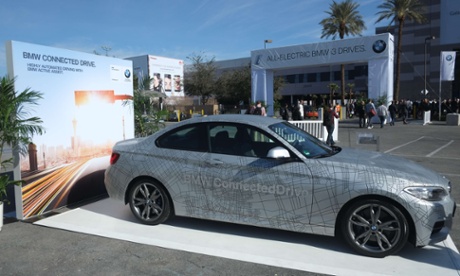
If you were a fan of Knight Rider and dreamed of a car that could talk, drive itself and save you from peril, hold tight: it's coming.
It does not exactly resemble Kitt, the Pontiac Firebird with a silky voice, and David Hasselhoff is not behind the wheel, but the spirit of the 1980s TV series pervades this week's Consumer Electronics Show in Las Vegas.
Car makers have taken over much of the world's biggest gadget expo to offer sneak previews of vehicles connected to smartphones and mobile computing technologies.
Google and chip-maker Nvidia announced an alliance with GM, Honda, Audi, Hyundai to install cutting-edge Android technology into cars, a response to Apple's vigorous promotion of its own iOS car technology.
“We're getting to the point where the car is an extension of you and really looks out for you,” said Thilo Koslowski, an automotive analyst at Gartner. “The car is ideally suited for this, more so than your phone or a tablet or another computing device.”
A vehicle was a controlled environment with space for multiple sensors, creating a unique platform to satisfy and anticipate needs and desires, he said.
“I can foresee that cars will become self-aware where they can really understand what is happening inside and outside. That together will create a self-aware vehicle that can look out for you, that can control the information and focus on providing the right information at the right times to protect you, inform you and entertain you.” Kitt was getting closer, said Koslowski.
In Knight Rider, conceived by producer Glen Larson as “the Lone Ranger with a car", Hasselhoff's character fights crime from the seat of a sleek black machine imbued with artificial intelligence, courtesy of a do-gooder billionaire. (Kitt was an acronym for Knight Industries Two Thousand).
The models being touted at CES – nine manufacturers have filled 140,000 sq ft of exhibition space, a quarter up from last year – are not designed to save you from villains with mullets so much as your environment.
A broken traffic light snarling early morning traffic? Your car, connected to your phone and household devices, may wake you up early to warn you and to suggest an alternative route. Temperatures dropping below freezing? It will ping you a message suggesting you start the engine, remotely of course, before your scheduled departure.
Once self-driving cars become legal – widely deemed a matter of when, not if – they will also be able to save you from yourself, your possibly texting, babbling, eating, boozing, distracted self.
“Driverless cars? It's coming,” said Barry Ratzlaff, director of customer connect at Hyundai Motor Company. “This” – he indicated a dashboard glowing with an 8.5in screen – “is going to become standard. All cars will be connected.”
We were seated in a Hyundai prototype with a built-in modem due for unveiling at next week's Detroit auto show. Gawkers on the expo floor peered into the tinted windows, trying in vain to see in.
“The last journalist I had in here asked to go to Hooters,” grinned Ratzlaff. “How about …” his voice adjusted for voice recognition software – “1807 Harvey Court, Colby, Kansas”.
The Google Places software pinpointed the location and suggested a route.
Ratzlaff gave another command. “Ethiopian food.” A list of five Ethiopian restaurants within a 2.1-mile radius appeared on the screen.
Hyundai will develop cars compatible with both the Android and iOS eco-systems to give consumers a choice, he said. It was unclear if it would do the same for Microsoft. “The jury's still out. We don't know if it'll grow enough.”
It remains to be seen whether an industry standard for connected cars and in-vehicle apps evolves.
Meantime even premium manufacturers are racing to collaborate with technology companies. Earlier this week, Audi's chairman Rupert Stadler said the company would install 4G high-speed broadband into its vehicles.
He showed off a 10.2-inch Android tablet, called the Mobile Audi Smart Display, which connects with wifi. Passengers can use it to control the car's infotainment system. It is designed to withstand crashes and extreme temperatures.
You can control BMW's new i3 electric car with Samsung's Galaxy Gear smartwatch and Bluetooth wireless technology.
Ford announced two new apps for its Sync AppLink system. One helps drivers access Parkopedia's 28m listed parking spots to search the nearest, cheapest options.
The other lets registered users order a Domino's pizza using voice-recognition software for either pickup or delivery. “Save your information in your Pizza Profile and it'll be sent to your house without even the push of a button, which strikes us as awesome a use of technology as we've ever seen,” gushed Autoblog.
In the wake of Her, a film set in the near future about a man who falls in love with the voice of his phone's operating system, it would be little surprise if Hollywood rebooted Knight Rider, this time with a female voice.
“A lot of people already have personal relationships with their automobiles and with this technology … the car will become an extension, a companion,” said Koslowski.

